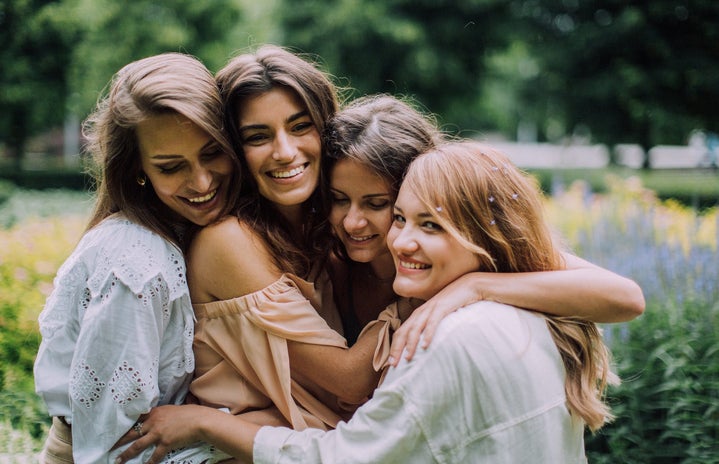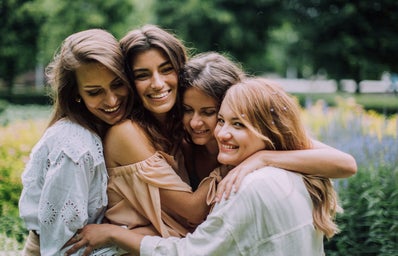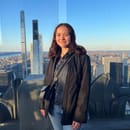Girlhood is texting “who’s free” to study on campus after your class ends. Girlhood is searching for hidden gem bookstores and thrift shops and getting bagels at local bakeries. Girlhood is doing each other’s makeup and hair before going out and splitting appetizers at dinner because you can’t decide what you’re in the mood for. It’s sending outfit pictures over text to get opinions and late-night grocery runs. It’s losing your voice singing, dancing and screaming over closely won hockey games. It’s week-long birthday celebrations and celebrating successes. It means so many different, beautiful things.
Interwoven in the night-out debriefs, the walks home from campus, and the late-night calls and FaceTimes is a level of intimacy that I don’t think can quite be replaced by any other type of relationship.
Despite my closest relationships with women and my friend group that has carefully and thoughtfully formed over my past three years in college, a part of my identity incessantly nudges at the back of my mind. Being queer is beautiful, but I think it’s always something that will try to hold me back in my relationships with straight friends.
Before fully coming out in my junior year of high school, I watched interviews, podcasts and YouTube storytimes of people being rejected or never treated the same by their long-time best friends or friend groups. While I was “out” for over a year in high school, no one really knew except my two best friends and family. It wasn’t exactly a secret, but it never really came up in my friendship circles. I was fine at the time with people assuming I was straight.
Coming into college, I knew it wasn’t really a part of my identity that I wanted to hide, so when the inevitable talk of the latest semester crushes and relationships came up with three new friends a couple weeks into freshman year, I made sure to clarify that I was not just interested in guys. They were considerate and nonchalant and exactly what I needed at the time. Besides a few hiccups, I’ve discovered a fully supportive group of friends.
In spite of that, there’s something I experience that they won’t ever be able to entirely relate to or understand; it feels like a barrier built up in my mind. The feeling manifests into cryptic isolation that may feel obvious to me but imperceptible to those who aren’t queer.
It’s as simple as focusing conversations on straight musicians or artists, the absence of gay relationships in books and movies, never venturing to intentional queer spaces or talking about crushes that, for everyone else, are predominantly men. If I want to talk about my new favorite LGBTQ+ artist or discuss a queer romance that recently resonated with me, it feels like forcing the conversation as a reminder of my identity rather than something that comes up naturally.
It’s instinctive to feel the mental barrier manifest physically. I feel rigidly aware of how I take up space and my proximity to others. I draw back from hugs and waver when shoulders brush on the couch or fingers graze when walking. Sometimes, I try to replicate the relaxed physical touch I see between other friends, but it just feels weird. They probably don’t overthink their movements as much as I do.
It’s a nuanced issue that I think lies in the implicit bias that is ever so prevalent in our society – for me and them. I feel like preconceptions and latent attitudes are so hard to brush aside due to the centering of heterosexual experiences in our society. We are socialized to fit into that box, and I, for one, can say that I’ve ceded to that societal pressure when it comes to having outwardly queer qualities. Being “straight passing,” which is often seen as a privilege in the queer community, only adds to the feeling of my sexuality being overlooked by my straight friends.
The added turmoil of internal homophobia is confusing and dispiriting. The same socialization that centers heterosexual experiences inherently abases others; any other romantic or sexual relationship is unnatural. Being bisexual/pansexual, a label I can’t even settle on myself, and the ever-evolving matter that is a person’s sexuality just make the matter even more complex. It’s easy to opt for a straight relationship and suppress that side of myself.
It’s easy, sure. But the idea of girlhood, despite its name, as I’ve come to realize, isn’t limited to just one type of experience. I think I’ve been short-sighted in my perspective thus far in my young adulthood. It doesn’t adhere to any specific time, just as it doesn’t adhere to any type of person — it’s a way of being and seeing for girls and non-binary people and gender fluid people. I’ve grown to appreciate this just as much as I’ve grown to appreciate the importance of predominantly queer spaces.
In queer spaces, I am recognized for who I am without an explanation. There’s less of an emphasis on labels and societal pressure. There are organic conversations about queer artists and representation in the media. There are externally queer clothes, makeup and characteristics. There are shared experiences, whether they be happy or sad. These spaces are so important, even if the topic of our sexualities rarely comes up in conversation.
I’ve come to value queer community just as I value my relationships with all my closest friends. I hold my girls near and dear to my heart. I found them when I needed them most, and my friendships with them are some of the most important in my life; living the small beauties of girlhood with them can never be replaced. I can, however, appreciate the significance of LGBTQ+ spaces and the comfort I feel there, where navigating intimacy is just a little bit simpler.


